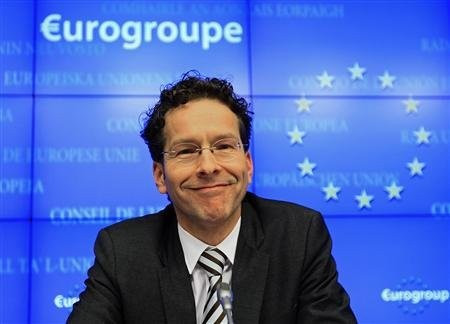Eurogroup President Dijsselbloem Opens Rift with ECB on Cyprus Rescue Strategy [VIDEO]

The controversial rescue of Cyprus and its beleaguered banking sector risks creating a major division within among the European Union, the European Central Bank and the International Monetary Fund that could harm marks and slow the so-called Troika's ability to support stressed financial markets in other parts of the Eurozone zone.
ECB executive board member Benoit Coeure has openly challenged the views of Jeroen Dijsselbloem in an interview published Tuesday in which he flatly rejects the idea, floated Monday by the Eurogroup president, that the unprecedented inclusion of both depositors and senior bondholders in the €17bn Cyprus bailout should be considered as a template for future Eurozone rescues.
"I think Mr. Dijsselbloem was wrong to say what he said," Coeure told Europe 1 radio. "The Cyprus experience is not a model for the rest of Europe because the situation had reached a level which cannot be compared with any other country."
Coeure's remarks reflect the growing confusion among investors in the Eurozone as to how the Eurogroup and the European Central Bank will co-ordinate in future financial rescues, particularly those with origins in the banking sector. His Governing Council colleague, Ewald Nowotny of Austria, agreed, telling reporters at a conference in the Czech Republic that "I think it has been made very clear that Cyprus is indeed a special case. It is no model for other instances," before not noting that financial markets are "very much aware that this Cyprus case is a special one."
The weekend decision to impose haircuts on both depositors and senior bondholders for the first time seems to suggest that last year's agreement to use the newly-formed bailout fund - the €700bn European Stability Mechanism - to directly recapitalize troubled banks may already be in question.
Dijsselbloem hinted as much during an interview with both Reuters and the Financial Times in which he said he hoped the ESM's recapitalisation ability would never be tested.
"If there is a risk in a bank, our first question should be 'Okay, what are you in the bank going to do about that? What can you do to recapitalise yourself?'," the Dutch finance minister told both Reuters and the Financial Times during an interview following the agreement Sunday to impose significant haircuts on uninsured depositors in Cypriot banks. "If the bank can't do it, then we'll talk to the shareholders and the bondholders, we'll ask them to contribute in recapitalising the bank, and if necessary the uninsured deposit holders."
Dijsselbloem's comments sent the European single currency into a tailspin late Tuesday, falling 1.2 percent to a four-month low of $1.2830 against the US dollar. Stocks also fell around the region, led by steep declines for bank shares, when the Eurogroup president's comments were published in the final hours of trading.
He repeated his view during an interview on Dutch television late Monday evening, telling the "Pauw & Witteman" programme that "banks should strengthen their balances -- they have to ensure they can be unwound when they get in trouble. Next, it should be possible to make shareholders and bond holders contribute to a rescue. That's how we move along. And then eventually you may get to a government contribution. That order was reversed in the last years."
The remarks, however, contrast a formal statement issued during market hours in which Dijsselboem called Cyprus "specific case with exceptional challenges which required the bail-in measures we have agreed upon yesterday. Macro-economic adjustment programmes are tailor-made to the situation of the country concerned and no models or templates are used."
Investors, however, remain concerned by the statement confusion and .
"A precedent is now set and it's no longer taboo to haircut deposits," wrote Morgan Stanley economists Daniele Antonucci and Tomasz Peitrzak in a client note published Tuesday. "We regard this as a policy mistake which has weakened the uniqueness of the Greek case, as there's now more than one 'unique' country with 'unique' problems addressed in a 'unique' way."
© Copyright IBTimes 2025. All rights reserved.





















